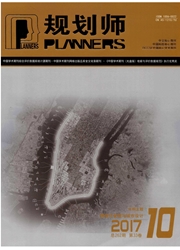

 中文摘要:
中文摘要:
城镇化的快速推进使区域中心城市面临着前所未有的压力,其空间发展质量及空间使用效率有待考评。文章以空间绩效为视角,在辨析其内涵的基础上,尝试构建空间绩效评价的指标体系,包含经济绩效系统、社会结构绩效系统、资源环境绩效系统、空间形态绩效系统和制度创新绩效系统5个子系统,采用全局主成分分析法对我国35个主要城市的空间绩效进行综合评价,重点探析各中心城市空间绩效的变化趋势、影响要素及动力机制。结果显示,我国35个中心城市的空间绩效可归纳为4个层级:东部地区城市的空间绩效平均得分最高;东北地区城市的层级划分明显,发展差距较大;中部地区城市的平均发展速度最为缓慢;西部地区城市的空间绩效水平最低,但提升幅度最大。在此基础上,文章从实施分层级差异化发展路径、提高空间结构及土地效率、建立规划考评及干预机制3个方面提出调控策略,以提升空间绩效水平及推动各区域经济的一体化发展。
 英文摘要:
英文摘要:
Fast urbanization pushes regional central city development, and their space quality and usage shal be evaluated. The paper introduces “space performance” concept, establishes a “space performance” evaluation system with five sub-systems:economy, social structure, resource and environment, space morphology, and institutional innovation. The paper evaluates the space performance of 35 cities with overal principal component analysis method, and concludes their characters: eastern cities score the highest in spatial performance, northeastern cities have the largest development gaps, central cities development are slow, and western cities have the lowest score in spatial performance. The paper further raises strategies in development path, spatial structure efifciency, and planning supervision mechanism.
 同期刊论文项目
同期刊论文项目
 同项目期刊论文
同项目期刊论文
 期刊信息
期刊信息
